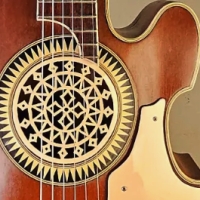DjangoBooks.com
Welcome to our Community!
Categories
- 20K All Categories
- 1.1K General
- 485 Welcome
- 59 Archtop Eddy's Corner
- 146 CD, DVD, and Concert Reviews
- 385 FAQ
- 26 Gypsy Jazz Italia
- 27 Photos
- 209 Gypsy Picking
- 21 Unaccompanied Django
- 15 Pearl Django Play-Along Vol.1
- 17 Gypsy Fire
- 45 Gypsy Rhythm
- 1.4K Gypsy Jazz University - Get Educated
- 131 Gypsy Jazz 101
- 230 Repertoire
- 227 History
- 709 Technique
- 51 Licks and Patterns
- 6 Daniel Givone Manouche Guitare Method Users Group
- 20 Eddie Lang Club
- 1.3K Gypsy Jazz Gear
- 813 Guitars, Strings, Picks, Amps, Pickups and Other Accessories
- 464 Classifieds
- 52 Recording
- 63 Other Instruments
- 18 Violin
- 5 Mandolin
- 22 Accordion
- 7 Bass
- 11 Woodwinds
- 351 Gypsy Jazz Events
- 144 North America
- 112 Europe
- 95 International










Comments
Very interesting observation and you're probably onto something since he listened to a lot of classical music.
But seems like a round about way to go about it. If you're interested in Django's approach why not take more direct path and learn some of his solos?
That's probably what he did too, transcribed his favorite classical pieces.
Then you can look at them from afar sort of, and think about his note choices, timing etc. If you don't wanna spend time transcribing yourself, look some up on soundslice.
I was amazed when I watched a bloopers video Dennis made with Bireli where Dennis was naming scales for him. Here's a guy who's a living encyclopedia of music in his fingers but can't name a single thing he plays from a theoretical perspective.
Some like structure so they order Gypsy picking, which is an amazing work, some listen to their heroes and imitate what they hear. Both will get there with time and practice, it's just what you think is better for you.
http://www.tedgreene.com/teaching/chords.asp
For many students of theory a clearly explained logical progression through the basic structure of western harmony is the easiest and fastest way through the subject.
Chapter list (quiz at end of each chapter)
1 Getting Started
2 Intervals
3 Triads
4 Chord Progressions
5. 7th Chords and Cord symbols
6. Extended chords
7. Scales
8. More About Chord Progressions
Appendix A How to read sheet music
Appendix B The Harmonic Series and Equal Temperment
Appendix C Answers to Questions
189 pages and I beleive the subtitle is accurate ...everything a real world musician needs to know in one well written easy to understand volume. Well worth the money IMO
I have no interest in, nor have never met or conversed with Jim Aiken. It's just a really really good book on the subject
Same with me, but sometimes its useful. Just a couple of days ago I talked to a friend who is studying music and when the conversation went to a more theory based ground I got completely lost. Thats why I would like to get a bit more "educated" on theory since it can make things easier sometimes.
Thanks for all the links! Gonna check them out!
I have heard once Martin Taylor say that he considered most of the early jazz guitarist to be very classical "trained" or aware. He said that in a way when they were playing lets say standards, he thought of it as a variation on a theme, and I think he was pretty much on point.
I have learned a few of Django solo pieces. I like to play solo guitar most of the time, kind of easier and it saves some time (and nerves), since finding people in my area interested in this sort of music is pretty hard. I learned them mostly by ear and with help of some yt videos where you can see a bit of fretboard, sometimes even the whole thing if you are lucky!
The last piece I learned from Django was his Improvisation 4. Had so much trouble to figure it out, not from a technical point, but when I played it, it just didnt sound right. So as you said I had to study it a bit, break it apart and lucky for me after some time I finally got it. The feel came along with the study and by playing his recording some many times I have lost count.
I am currently working on Tal Farlow version of Autumn Leaves and Phantasia in D major by David Kellner and I am gonna take your advice and take some time to transcribe them. Pretty sure something good will come out of it
I think I have seen that video, and some other ones where they asked some other player to break down what he played and he said I have no idea. Funny but also pretty amazing how this sorts of things can be achieved.
Well I think the best is bits of both worlds combined together, but again that is what I think will work the best for me.